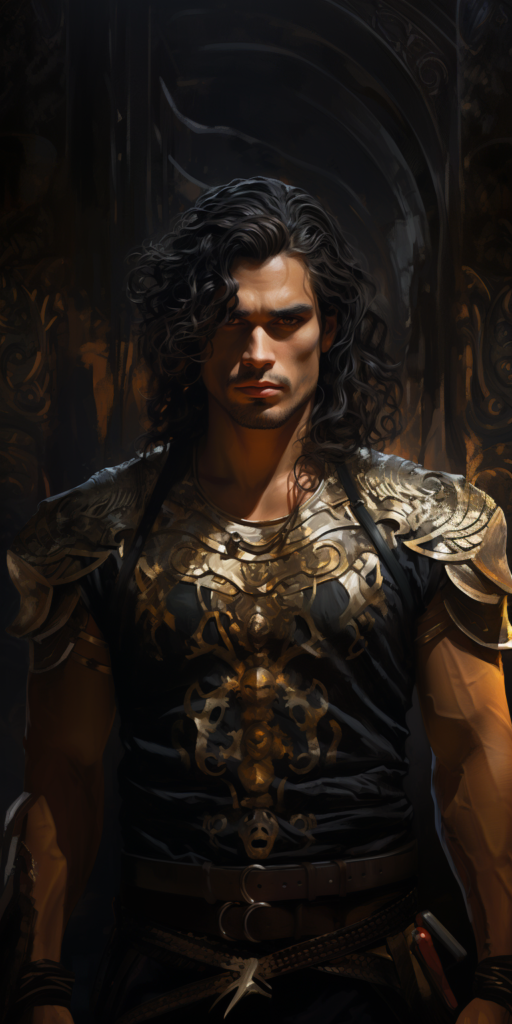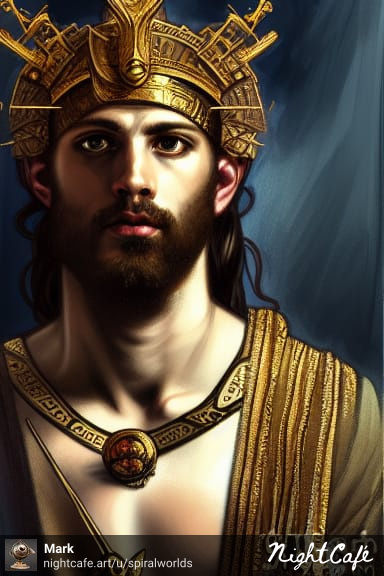Aegisthus, The Avenger of Atreus
“Betrayal, Revenge, and Dark Secrets: Meet Aegisthus, the Sinister Puppeteer of Fate!”

- Alias: The Avenger of Atreus
- Gender: Male
- Race: Human
- Occupation: Noble, Schemer
- Religion: Worshiper of the Hellenic Pantheon
- Allies: Clytemnestra (his lover and partner in vengeance), Nauplius son of Clytoneus (Nauplius the Wrecker), loyal followers and conspirators
- Enemies: Agamemnon, House of Atreus (Orestes, Electra)
- Abode/Base of Operations: Mycenae, the city of Agamemnon
- Nationality: Greek
- Languages: Common, Greek
- Alignment: Lawful Evil
- Affiliation(s): House of Atreus, Trojan allies during the Trojan War
- Significant Others: Clytemnestra (lover and partner in vengeance)
Aegisthus is a complex and enigmatic character, driven by a relentless pursuit of power and vengeance. He is a man consumed by a deep-seated desire to rewrite the course of his own fate and exact revenge on those he believes have wronged him. Born into a noble family, Aegisthus was destined for greatness, but his life took a tragic turn when his father was killed by Agamemnon, the ruler of a rival kingdom.
This traumatic event left an indelible mark on Aegisthus, fueling a burning hatred and an insatiable thirst for retribution. Over the years, he meticulously planned his revenge, carefully orchestrating a web of deceit and manipulation. Aegisthus is a master of subterfuge, using his cunning intellect and charm to influence and control those around him, weaving a complex tapestry of intrigue.
Driven by his desire for power and his unquenchable thirst for vengeance, Aegisthus manipulates the events unfolding around him, pulling the strings from the shadows. He is a puppeteer, meticulously orchestrating the downfall of his enemies and shaping the destiny of those he encounters. His actions are fueled by a sense of entitlement, a belief that he is the rightful ruler and that he is justified in his quest for power and revenge.
While Aegisthus is often seen as a villainous figure, there are layers to his character that reveal a deeply wounded soul. His thirst for power and vengeance stems from a deep sense of betrayal and loss, and his actions are driven by a desperate need to regain control over his own destiny. Aegisthus seeks to achieve a world where he stands at the pinnacle of power, where he is revered and feared by all.
In his current state, Aegisthus finds himself surrounded by a dark and foreboding atmosphere. He is constantly plotting and scheming, his mind always calculating the next move in his intricate game of manipulation. While a sense of darkness permeates his surroundings, there is also a palpable air of tension and anticipation, as if the world itself holds its breath, waiting to see how Aegisthus’s grand designs will unfold.
Deep down, Aegisthus yearns for validation and recognition. He seeks to prove his worth and rewrite the narrative of his life, turning the tides in his favor. It is this relentless pursuit of power and vengeance that drives him forward, shaping his every action and decision. Aegisthus is a character consumed by his own ambition, a figure who will stop at nothing to achieve his goals and reshape the world in his own image.
Aegisthus, the Betrayer

Medium humanoid (human), lawful evil
Armor Class: 17 (breastplate) Hit Points: 150 (20d8 + 60) Speed: 30 ft.
| STR | DEX | CON | INT | WIS | CHA |
|---|---|---|---|---|---|
| 16 (+3) | 14 (+2) | 16 (+3) | 12 (+1) | 14 (+2) | 18 (+4) |
Saving Throws: Dex +6, Con +6, Cha +8 Skills: Deception +8, Perception +6, Stealth +6 Senses: Passive Perception 16 Languages: Common, Ancient Greek Challenge: 12 (8,400 XP)
Brave. Aegisthus has advantage on saving throws against being frightened.
Actions
- Multiattack. He makes two melee attacks: one with his shortsword and one with his dagger.
- Shortsword. Melee Weapon Attack: +8 to hit, reach 5 ft., one target. Hit: 9 (1d6 + 6) piercing damage.
- Dagger. Melee or Ranged Weapon Attack: +6 to hit, reach 5 ft. or range 20/60 ft., one target. Hit: 6 (1d4 + 4) piercing damage.
Reactions
- Vengeful Parry. When a creature makes a melee attack against Aegisthus, he can use his reaction to add 4 to his AC against that attack. If the attack misses, Aegisthus can make a melee weapon attack against the attacker.
Legendary Actions
Aegisthus can take 3 legendary actions, choosing from the options below. Only one legendary action option can be used at a time, and only at the end of another creature’s turn. Aegisthus regains spent legendary actions at the start of his turn.
- Attack. Aegisthus makes one melee attack.
- Dark Influence. Aegisthus uses his menacing presence to demoralize his foes. Each creature of his choice within 30 feet must make a DC 15 Wisdom saving throw or be frightened until the end of their next turn.
- Betrayal Strike (Costs 2 Actions). Aegisthus delivers a treacherous strike against a target. Make a melee weapon attack with advantage. On a hit, the target takes an additional 14 (4d6) necrotic damage, representing the weight of betrayal.
Equipment
Aegisthus is equipped with:
- Breastplate – A sturdy armor that provides protection without sacrificing mobility.
- Shortsword – A wickedly sharp blade designed for swift and precise strikes.
- Dagger – A small, versatile weapon perfect for close-quarters combat or concealed attacks.
- Poison Vial – A small vial containing a deadly poison, ready to be applied to his weapons when necessary.
- Signet Ring – A ring bearing his family crest, a reminder of his dark heritage and ambitions.
Plot Hooks
- The Avenger’s Path: Aegisthus, driven by a deep-seated desire for vengeance, seeks out the players who have unwittingly become entangled in the web of his tragic past. He reveals his identity as the long-lost son of a slain king, urging the players to aid him in reclaiming his birthright and exacting retribution on those responsible for his family’s downfall.
- The Dark Prophecy: He possesses a cryptic prophecy that foretells the rise of a chosen hero destined to defeat an ancient evil. He convinces the players that they are the ones destined to fulfill this prophecy, but little do they know that Aegisthus has manipulated the prophecy to serve his own malevolent agenda, using their unwitting assistance to further his own power.
- The Fallen Noble: He was once a respected noble with a promising future, was cast out and disgraced due to false accusations and political manipulation. He seeks the players’ aid in uncovering the truth behind his downfall and restoring his tarnished name. However, as they dig deeper into the conspiracy, they begin to question Aegisthus’s innocence and unravel a complex web of deceit.
- The Seductive Charmer: He possesses an uncanny ability to charm and manipulate others, using his allure to enlist the players’ loyalty and trust. He plays upon their desires and weaknesses, tempting them with promises of wealth, power, and forbidden knowledge. The players must navigate the treacherous waters of his manipulations, questioning their own motives and allegiances.
- The Curse of Blood: Aegisthus carries a hereditary curse that plagues his family for generations, driving them to commit heinous acts. He seeks a way to break this curse and end the cycle of violence. The players become entangled in his quest, discovering ancient rituals, lost artifacts, and dangerous secrets that hold the key to his salvation or damnation.
- The Relentless Pursuit: Aegisthus becomes obsessed with tracking down a powerful artifact that holds the key to unlocking his hidden potential. He believes that by harnessing its power, he can reshape the world according to his own vision. The players find themselves caught in a race against time as they attempt to acquire the artifact before Aegisthus, all while unraveling the enigmatic clues and facing deadly challenges along the way.
- The Shadow King: Aegisthus has gained control over a hidden organization of spies and assassins, operating from the shadows to manipulate events and further his own agenda. He recruits the players into his ranks, tasking them with carrying out covert missions and eliminating his enemies. As they delve deeper into this dark world, the players must decide where their loyalties truly lie and whether they can stomach the morally ambiguous path they have embarked upon.
- The Lost Memories: Aegisthus suffers from fragmented memories and seeks the players’ assistance in unlocking the secrets of his past. As they delve into his forgotten history, they uncover a tale of tragedy, betrayal, and lost love. Aegisthus’s journey of self-discovery becomes intertwined with the players’ own quest, blurring the lines between ally and adversary, and forcing them to confront their own past and future.
Currently in the World
Aegisthus is a tall and imposing figure, standing at around six feet in height. His strong, muscular frame is covered by weathered and battle-worn armor, displaying the marks of countless conflicts. His disheveled hair falls to his shoulders, framing a face hardened by the weight of his dark deeds.
Currently, he stands in the dimly lit halls of an palace. The air is heavy with tension, and the remnants of past grandeur loom overhead, their faded glory a haunting reminder of a bygone era. Shadows dance across the worn stone walls as Aegisthus moves with a predatory grace, his eyes gleaming with a mix of determination and malice.
His mood is one of smoldering anger, driven by a thirst for revenge and the lust for power. Aegisthus’s face bears a perpetual scowl, his jaw set in a grim determination to achieve his twisted ambitions. The weight of his actions rests heavily on his shoulders, yet he shows no remorse for the dark path he has chosen.
Aegisthus’s presence commands attention, his every movement oozing with an aura of calculated menace. His grip tightens around the hilt of a wickedly sharp sword, a weapon forged in treachery and bloodshed. The dim light glints off the blade’s edge, casting an eerie glow in the otherwise gloomy surroundings.
As he traverses the halls, his footsteps echo with a chilling resolve, marking his relentless pursuit of power and retribution. Aegisthus embodies a brooding force, a harbinger of impending doom and a symbol of the destructive forces that lurk within the human psyche.
In Myth

Thyestes felt he had been deprived of the Mycenean throne unfairly by his brother, Atreus. The two battled back and forth several times. In addition, Thyestes had an affair with Atreus’ wife, Aerope. In revenge, Atreus killed Thyestes’ sons and served them to him unknowingly. After eating his own sons’ corpses,
Thyestes asked an oracle how best to gain revenge. The advice was to father a son with his own daughter, Pelopia, and that son would kill Atreus. When Aegisthus was born, his mother was ashamed of her incestuous act. She abandoned him and he was raised by shepherds and suckled by a goat.
Atreus, not knowing the baby’s origin, took Aegisthus in and raised him as his own. When Aegisthus reached adulthood, Thyestes revealed his true parentage, that he was both father and grandfather to Aegisthus, who then killed Atreus and seized the throne.
Aegisthus and Thyestes ruled over Mycenae jointly, exiling Atreus’ sons, Agamemnon and Menelaus to Sparta, where King Tyndareus gave the pair his daughters, Clytemnestra and Helen, to take as wives. At his death, Tyndareus gave his throne to Menelaus, who then helped Agamemnon overthrow Aegisthus and Thyestes.
After Agamemnon left Mycenae for the Trojan War, Aegisthus wanted to seduce his wife, Clytemnestra (mother of Erigone). Agamemnon had left Clytemnestra with a singer; as long as the singer was present, Clytemnestra resisted Aegisthus. Aegisthus then took the singer to a deserted island, slit his throat and Clytemnestra was seduced.
After offering up thanks to the gods for the success with which his criminal exertions he was crowned as the queen’s consort. In order not to be surprised by the return of Agamemnon, he sent out spies, and when he came, Aegisthus persuaded Clytemnestra to kill Agamemnon (and his new concubine, Cassandra); they subsequently ruled Mycenae for seven years.
Eight years later, Agamemnon’s son, Orestes, and his daughter, Electra, returned to Mycenae and killed both Clytemnestra and Aegisthus. Much later, when Orestes was visiting Iphigenia in Crimea, Aegisthus’ son, Alete, took over Mycenae. Orestes killed him upon his return.

 Buy me a coffee
Buy me a coffee